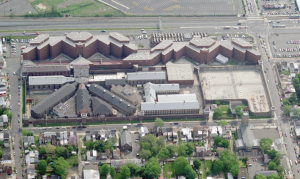Podcast: Play in new window | Download
Prison State of America: Chris Hedges, Earl Amin, Amos Caley
Today we hear from 3 extraordinary people that will move you to anger, tears and outrage. Chris Hedges is an award winning journalist and former New York Times Middle East bureau chief . His recent article is Prison State of America outlines in detail how prison workers are gouged by corporate run private prisons. Earl Amin is a former Black Panther who was sentenced to life in prison for conspiracy to commit robbery and served 35 years which is the longest sentence in the state of New Jersey. Amos Caley is with the Interfaith Prison Coalition and a graduate student in the School of Social Work and is with the National Religious Campaign Against Torture, that exposes the abusive practice of solitary confinement in New Jersey prisons
Chris Hedges:
- What we’ve seen in the last few years is a steady assault, economic assault against prisoners and their families.
- Your minimum wage is about $1.30 a day. 8 hours of work, you’re doing prison labor, you work for the state. You’re paid a 1.30.
- They pay you for 5 days a week. That’s about 28 dollars a month.
- Deodorant, stamps, toothpaste, all of this stuff has risen by in many cases over 100 percent.
- Wages in the society at large have remained stagnant and in real terms declined and yet the commissary items have gone through the roof.
- The standard footwear are Reeboks, which cost 45.00. If you don’t have 45.00, they will sell you these sneakers with cardboard soles. The first time you go out in the yard, they’re shredded.
- If you don’t have any money, the prison system has thoughtfully provided a loan system so you can go into debt peonage.
- We have seen private corporations take over the phone system.
- We have seen the removal of other items like thermals. They used to give two blankets, now they give one.
- They’ve also privatized the system where you put money on a prisoners account. Jpay. Again charging draconian fees.
- Remember, we’re talking about very very poor families.
- What we’re seeing now is larger and larger numbers of people within the system who are not only broken, because most families don’t have the resources to send money in those incarcerated, because most of the incarcerated were the primary wage earner, people are going into debt.
- You have a 10 thousand dollar fine imposed on you when you’re sentenced. You’re earning 28 dollars a month, you have no outside resources.
- 25 years later, this is an actual case, you still owe 4 thousand dollars.
- People are finishing prison in debt. The very forces of predatory capitalism that are destroying working men and women outside the walls of prison, are running rampant inside the walls of prison.
- That is a kind of window of what’s going to happen to rest of us.
- Much of the military equipment is produced by federal prisoners – Kevlar jackets, body armor, canteens, etc
Guest – Chris Hedges, Pulitzer-Prize winning author and journalist. He was also a war correspondent, specializing in American and Middle Eastern politics and societies. His most recent book is ‘Death of the Liberal Class (2010). Hedges is also known as the best-selling author of War is a Force That Gives Us Meaning (2002), which was a finalist for the National Book Critics Circle Award for Nonfiction.
—–
Earl Amin:
- In 1967, I was drafted right out of high school into the Army.
- I met this white kid from Boston and he said Earl let’s go into town tonight which is Augusta, they some bad cats out there, I want you to meet them.
- I thought he was talking about Motown, Temptations, I never thought he’d talk about the Black Panthers. I went out there and heard these guys talking about the government.
- Later on I was transferred to Fort Dix, New Jersey – went to Central Park with my sister, Angela Davis was speaking. I had on my Army uniform. She said brother are you in the Army, I said yea. You been to the South? She said you don’t need to be this army you need to be in our army.
- I went AWOL that day. I joined the panthers that day until the FBI caught up with me six months later and charged me with being AWOL and sent me to Fort Leavenworth.
- I stayed there about nine months and they released me, went back to being a panther again, came home.
- Later on I was involved with something called Operation Breadbasket out of Chicago. We was out there feeding the poor people. I was out there when Fred Hampton was killed.
- I got arrested for guns. I went back to prison for a few months and came out.
- Then I got arrested for conspiracy to commit bank robbery, just talking about it. I was given a life sentence.
- I went to New Jersey State prison, Trenton.
- I started doing a lot of para-legal work and helping a lot of other people get out of prison.
- One judge told me if I was sentencing you today, I would give you 3 years.
- I was the first person in the history of the state to be sentenced to life for a robbery charge.
- Being 65, I took a job as a construction worker working 2 days a week, barely enough.
- I was listening to POP, Peoples Organization for Progress, with Larry Ham.
- For years and years I’ve earned a dollar thirty a day.
- That’s one of the problems, I’m comin home. I can’t get social security cause I ain’t paid nothing into social security.
- I can’t get a job because of my age, so what am I supposed to do?
- If you didn’t work, you didn’t get no toothpaste, you didn’t get no coffee.
- I personally, filed my own divorce.
- Rubin Hurricane Carter was my hero. Rubin resisted everything.
Guest – Earl Amin, a former Black Panther who was sentenced to life in prison for conspiracy to commit armed robbery. Earl has been released from prison after 35 years.
—–
Amos Caley – Interfaith Prison Coalition
- We’re realizing that talk is cheap. Looking at people who are most affected, and what they’re doing in terms of mobilizing themselves around this, is really a key to creating a sustained grassroots effort against the (predatory capitalist) system.
- We really have to organize around the demands of the families and the victims.
- That’s what the Interfaith Prison Coalition is about.
- One of things we’re doing is mounting a campaign to make it so that prisoners are paid minimum wage.
- We’re talking about a minimum wage for service workers on the outside, which will have a huge impact.
Guest – Amos Caley, a graduate student in the School of Social Work and is with the National Religious Campaign Against Torture, that exposes the abusive practice of solitary confinement in New Jersey prisons.
————————————————————
Please help support Law and Disorder by clicking on Fractured Atlas graphic (link is fixed). This radio show is now a sponsored project of Fractured Atlas, a non-profit arts service organization. Contributions for the charitable purposes of Law and Disorder must be made payable to Fractured Atlas only and are tax-deductible to the extent permitted by law. You can donate as little as 5.00 a month.

